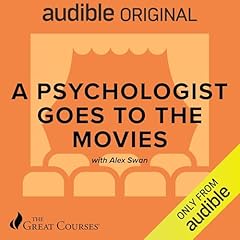
How to View and Appreciate Great Movies
No se pudo agregar al carrito
Add to Cart failed.
Error al Agregar a Lista de Deseos.
Error al eliminar de la lista de deseos.
Error al añadir a tu biblioteca
Error al seguir el podcast
Error al dejar de seguir el podcast
 Exclusivo para miembros Prime: ¿Nuevo en Audible? Obtén 2 audiolibros gratis con tu prueba.
Exclusivo para miembros Prime: ¿Nuevo en Audible? Obtén 2 audiolibros gratis con tu prueba.Compra ahora por $21.53
-
Narrado por:
-
Eric Williams
What makes a movie “great”? Was it a particularly well-acted scene? The dramatic lighting? The emotion of the music? The tension that has built up? A powerful choice of words? The answer is, simply, yes.
Sit down with renowned professional filmmaker, author, and award-winning professor Eric R. Williams to unpack the elements of more than 250 “great” movies - some well-known, others less so - including Casablanca, Jaws, The Godfather, Star Wars, Rocky, Do The Right Thing, The Wizard of Oz, and more in order to gain insights and secrets that will change the way you view films. You’ll discover how from the moment you sit down, great filmmakers control every sensation the movie experience evokes: tremors or tears, goosebumps or giggles, and why it is that we invite them to do this. You’ll also uncover the tricks used to help us suspend our disbelief, let go of our cynicism, and buy into a story using sounds, scores, lighting, color, special effects, and more. You’ll discover how even these seemingly small details can greatly enhance or detract from the theme, atmosphere, and plot.
Professor Williams often refers to filmmaking as a magic show. And once you pull back the curtain to see the creative process from the filmmaker’s point of view, the magic show can never be the same again. But understanding the intent of each aspect of moviemaking - from lighting to language, color to characters, stars to scores - arms you with new set of creative and analytical tools with which to bring to the theater or to revisit your old favorites. These insights will strengthen your love and appreciation for what’s unfolding before your eyes.
Roger Ebert once said, “Every great film should seem new every time you see it” and that’s exactly what How to View and Appreciate Great Movies ensures.
PLEASE NOTE: When you purchase this title, the accompanying PDF will be available in your Audible Library along with the audio.
©2018 The Great Courses (P)2018 The Teaching Company, LLCLos oyentes también disfrutaron:




















Las personas que vieron esto también vieron:


Very helpful, but…
Se ha producido un error. Vuelve a intentarlo dentro de unos minutos.
Great Introduction to Film Appreciation
Se ha producido un error. Vuelve a intentarlo dentro de unos minutos.
That said, this audio series of lectures is in desperate need of an editor. There were points where the speaker lost his place in the notes or made mistakes and the audio just kept going.
A good intro to the subject.
Se ha producido un error. Vuelve a intentarlo dentro de unos minutos.
Perhaps a Great Course for those with more intellectual tastes than mine.
Not the way I appreciate great movies
Se ha producido un error. Vuelve a intentarlo dentro de unos minutos.
I need to watch more movies
Se ha producido un error. Vuelve a intentarlo dentro de unos minutos.



